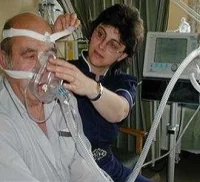A Johns Hopkins Medicine-led study shows that nearly 30 percent of all ICU patients develop delirium, a condition that prolongs hospital stays and significantly increases one’s risk of dying in the hospital. The findings are published in the British Medical Journal (BMJ).
Although intensive care teams have long been aware that a significant percentage of their patients develop delirium, this study establishes the most definitive link between delirium in the ICU and poor outcomes.
“Every patient who develops delirium will on average remain in the hospital at least one day longer,” says one of the study's authors Dr. Robert Stevens, a specialist in critical care and an associate professor at the Johns Hopkins University School of Medicine. Worse, “if you're admitted to the intensive care unit and you develop brain dysfunction, your risk of not surviving your hospital stay is doubled.”
Dr. Stevens and colleagues performed a systematic review and meta-analysis of available data on delirium in ICU patients. They sifted through 10,000 published reports before selecting 42 studies that met their specific criteria. They excluded studies that primarily enrolled patients with head injuries, strokes or other neurological disorders, or focused on sedation management or alcohol or substance withdrawal.
Delirium was identified in 5,280 of 16,595 (31.8 percent) critically ill patients reported in the 42 studies included in the meta-analysis. Dr. Stevens and his team found that delirium was associated with a twofold increase in hospital mortality even after adjusting for severity of illness.
Delirium is a type of brain dysfunction characterised by a sudden onset, fluctuating symptoms, inattention and confusion. One of the best known causes of delirium is medications given to ICU patients, such as sedatives. For example, benzodiazepine, which is commonly administered to patients to help them calm down and sleep, may ironically lead to disorientation and confusion. The use of such potentially harmful medications, particularly among higher risk populations (eg, the elderly and individuals with dementia), should be reduced or eliminated, the researchers say, adding that nighttime interruptions should also be minimised to ensure that patients get a good night’s rest without sedatives.
Notably, Dr. Stevens’ review also showed that among patients who develop delirium, the risk of long-term cognitive decline increases by 20 to 30 percent. “We’re seeing that even though you may have a very severe illness or injury and you’re lucky enough to survive, you’re still not quite out of the woods,” he says. “We need to think about the measures we can put into place to decrease these long-term burdens.”
Source: Johns Hopkins Medicine
Image credit: Flickr.com
Although intensive care teams have long been aware that a significant percentage of their patients develop delirium, this study establishes the most definitive link between delirium in the ICU and poor outcomes.
“Every patient who develops delirium will on average remain in the hospital at least one day longer,” says one of the study's authors Dr. Robert Stevens, a specialist in critical care and an associate professor at the Johns Hopkins University School of Medicine. Worse, “if you're admitted to the intensive care unit and you develop brain dysfunction, your risk of not surviving your hospital stay is doubled.”
Dr. Stevens and colleagues performed a systematic review and meta-analysis of available data on delirium in ICU patients. They sifted through 10,000 published reports before selecting 42 studies that met their specific criteria. They excluded studies that primarily enrolled patients with head injuries, strokes or other neurological disorders, or focused on sedation management or alcohol or substance withdrawal.
Delirium was identified in 5,280 of 16,595 (31.8 percent) critically ill patients reported in the 42 studies included in the meta-analysis. Dr. Stevens and his team found that delirium was associated with a twofold increase in hospital mortality even after adjusting for severity of illness.
Delirium is a type of brain dysfunction characterised by a sudden onset, fluctuating symptoms, inattention and confusion. One of the best known causes of delirium is medications given to ICU patients, such as sedatives. For example, benzodiazepine, which is commonly administered to patients to help them calm down and sleep, may ironically lead to disorientation and confusion. The use of such potentially harmful medications, particularly among higher risk populations (eg, the elderly and individuals with dementia), should be reduced or eliminated, the researchers say, adding that nighttime interruptions should also be minimised to ensure that patients get a good night’s rest without sedatives.
Notably, Dr. Stevens’ review also showed that among patients who develop delirium, the risk of long-term cognitive decline increases by 20 to 30 percent. “We’re seeing that even though you may have a very severe illness or injury and you’re lucky enough to survive, you’re still not quite out of the woods,” he says. “We need to think about the measures we can put into place to decrease these long-term burdens.”
Source: Johns Hopkins Medicine
Image credit: Flickr.com
References:
Stevens RD, Wang H, Schneider EB et al. (2015) Outcome of delirium in critically ill patients: systematic review and meta-analysis. BMJ 2015;
350 doi: http://dx.doi.org/10.1136/bmj.h2538
Latest Articles
healthmanagement, delirium, critically ill, sedatives, brain dysfunction, cognitive decline
A Johns Hopkins Medicine-led study shows that nearly 30 percent of all ICU patients develop delirium, a condition that prolongs hospital stays and significantly increases one’s risk of dying in the hospital.










